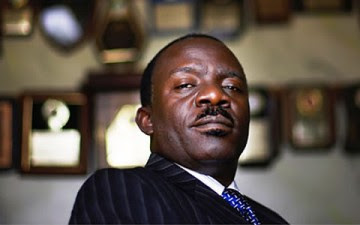QUESTIONS FOR FEMI FALANA AND SIMILAR EXPERTS ON THE ALLEGED BUDGET PADDING BY THE NATIONAL ASSEMBLY.
Dear Mr Femi Falana, SAN,
I monitored your opinions on July 31, 2016 via Channels Television on the issue of alleged padding of the budget. Being one person I have admired over the years and have the greatest admiration for on point of law, public advocacy and rights protection, I wish to kindly seek the following clarifications to help me get a better handle on the matters in issue:
1. Is the budget an act of the National Assembly or a product of Mr President’s desires? Specifically, whose constitutional responsibility is the Appropriation Act (not the Appropriation bill) with particular reference to and combined reading of sections 4, 59, 80 and 81 of the constitution?
2. Can the estimates presented by Mr President under section 81(1) of the constitution become an appropriation act without the legislative inputs of the National Assembly with particular reference to section 59(2)(3) of the same constitution? Specifically, what in your opinion was the intention of the framers of the constitution in subjecting the budget to same lawmaking process of the National Assembly with specific clarification in section 59 of the constitution?
3. Can an estimate proposed by Mr President and passed in exact amount by the NASS be deemed illegal and padding under any circumstance simply because the assembly broke the lump sum down into discrete projects for implementation? For instance, the zonal intervention fund or so called constituency projects?
4. What exactly is illegal or immoral about the constituency projects fund(always proposed and executed by the executive the same way as other capital projects in each budget)? Do you truly believe that the annual constituency projects of N100billion (approx 5% of the 2016 capital appropriation) for the NASS is the greatest source of corruption or executory inefficiency in our budgets!
Are you aware that it operates much in the same pattern as Porkbarrel projects in the USA and even in greater dimension in Kenya as the National Government Constituency Development Fund, where 2.5% of its federal government share of revenue is set aside for constituency constituency and its budgetary approval and implementation significantly controlled by the legislature?
5. What exactly in the allegations by Hon Jibrin constitute a criminal act, padding or illegality given that they all relate to alleged proposed budgets for different parts of the country and for which no funds have been expended?
6. What exactly would the DSS, Police, EFCC and ICPC be investigating given that all documentary exhibits presented by Hon Jibrin are either not part of the signed budget or are parts of the harmonized budget jointly undertaken and agreed to by a harmonization of the NASS and the executive; and ultimately assented to by the President?
7. If any project in the budget asented to by Mr President is considered “a padding” and therefore criminal, can the President; whose document the signed budget is be exonerated from indictment and; if so, why? If not, what should be his sanction?
8. Hon Jibrin who is alleging wrong doing against some members is the only member of the house whose signature is on the approved budget in his capacity as Appropriation Committee chairman; meaning that it is his product. Having willfully hidden information of alleged criminality and wrongdoing at his disposal from other members, the President and the public, and having gone ahead to authenticate the document as correct and error free; can he now after removal from office be a credible source of the allegations he’s making and warrant reliance? Should he not be under prosecution as a self confessed criminal?
9. Is there any project among those allegedly “padded” by named members that is of exclusive personal benefit of the said member and that is designed to be implemented by the member of the Nass instead of the executive?
10. Is there any evidence that indicts any member of the Nass or suggests that the funds allocated for the projects alleged by Hon Jibrin were released to the member or was to be so released?
11. Assuming without conceding that those projects were paddings to the budget and the implementation still remains at the discretion of the executive, what exactly constitutes a criminal act now to be punished by any authority; even as none of the projects has been implemented and no public fund is missing thereby?
12. Under what conditions can the President choose and pick what portions of a law assented to by him, another President or indeed any other extant law to comply or not to comply with? And would you blame the Nass if it decides to defend the constitution and/or sanction such breach of extant laws; including the appropriation act, if it occurs? Would you under any circumstance encourage the President or other executive actors to willfully refuse, fail or refrain from implementing an extant law without the pronouncement of the court as to the law’s unconstitutionality or illegality? Does the Appropriation Act assented to by Mr President fail on any score as an operative law of the nation? How would you then justify a call to investigate, indict or prosecute a member of the NASS for his lawmaking role?
13. Are you not concerned, as a senior lawyer and rights activist, that this campaign is a violation of the constitutional rights of the legislature and a threat to democracy given that there’s is no judicatory foundation for the push to criminalize the work of the NASS in its ordinary cause of lawmaking?
14. Sections 58 and 59 of the constitution prescribe the lawmaking processes by the NASS with section 59 referring specifically to the appropriation and related bills. Do you agree that the only difference between the two sections is in the prescription of a specific time frame and mode of resolution of differences? Even at that, do you acknowledge that section 59 recognizes the possibility of differences between versions passed by both chambers? What in your opinion may constitute such differences?
15. To what extent should “provisions” made by the National Assembly now be called “padding”? Are we not unwittingly walking ourselves into the territory of “an imperial presidency”? What indeed should be the role of the legislature in appropriation process? A rubber stamp? What is the utility of this public-induced role to the Nigeria project?
16. Would you be surprised if after this intervention, Hon Abdulmumin suddenly releases further evidence indicting me of “budget padding” as the thirteenth member of the House so indicted?
I shall be most grateful to hear from you. You must permit me also to share these thoughts with the public using every media available to me. In so doing, I will hope that other experts will also contribute to enriching my knowledge of the issues at stake and further empower me to more effectively address the them as a participant.
Accept the assurances of my esteemed. @ Ubong David
 Hottestgistnaija.com
Hottestgistnaija.com





